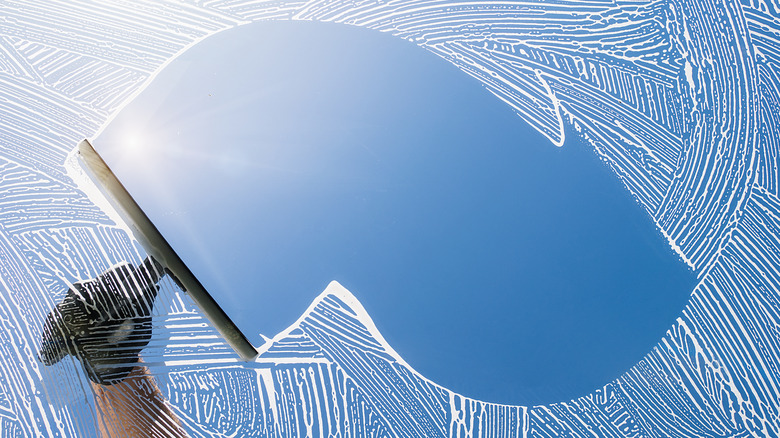Baking soda, that omnipresent household staple with a thousand and one uses from making cookies to polishing teeth, has another specialized function: It’s great for cleaning your windows. And not just the glass, but also the sills, frames, and tracks. The alkaline powder can be used on both the inner and outer window panes, it’s able to combat grimy buildup on the glass or surrounding areas, and it works wonders on sea spray residue for those residing close to the ocean.
Also known as sodium bicarbonate, baking soda is an inexpensive, eco-friendly, and organic alternative to harmful window cleaners. Per Fantastic Services, since many children and adults suffer from allergies, using natural cleansers helps avoid the negative reactions associated with chemical detergents. Interestingly, the origins of baking soda can be traced back 4 million years ago, when deposits of the mineral trona were formed as salt lakes dried up, according to Everyday Health. Wyoming is home to the largest source of trona in the world, making the area the primary source of baking soda.
Cleaning windows with the stuff is a simple process, requiring just a few additional supplies such as vinegar, dish soap, water, cloths or sponges, a squeegee, and a spray bottle. While you’re at it, the all-purpose homemade cleaner can also restore your bathroom fixtures, mirrors, and shower glass.
Baking soda window spray

There are several ways to use baking soda to clean your window panes. For windows that are relatively clean, Mind Body Green recommends combining 2 teaspoons of baking soda, 1 teaspoon of Castile soap, and water (preferably distilled) in a 16-ounce bottle. Mix well and spray onto the surface. Wash from the top down, employing a zig zag motion and then from side to side. Then wipe off using a cotton towel. The solution can have vinegar or rubbing alcohol added for cleaning strength, or a bit of essential oil included for a more pleasing fragrance.
Maidfeed suggests cleaning your windows a minimum of twice a year using baking soda and a diluted white vinegar solution. This will serve the dual purpose of lifting dirt and debris while leaving a streak-free shine. Using a newspaper or cloth, wipe each window before cleaning to remove as much dirt as possible. Next, dampen a cloth or tissue, add a small amount of baking soda, and gently scrub visible dirt or smudges. Follow up by spraying a 10% white vinegar solution on the glass, then wipe clean. Immediately wiping off and drying thoroughly will prevent streaks from appearing. If dissatisfied with the spraying results, repeat the process using a sponge dipped in vinegar, wiping down the window, and finishing by using a squeegee device to remove any excess.
Clean frames, sills, or salt-sprayed windows
Baking soda can also be used to remove dirt and stains from wooden or vinyl sills and window tracks. The Intentional Mom recommends a combination of baking soda and vinegar to remove the grimy buildup. First, sprinkle the baking soda where needed and pour vinegar over it. Let this soak for several minutes, then use a toothbrush to scrub any especially hard-to-reach areas. A cloth can be wrapped around a butter knife to achieve the same results in tight corners and crevices. Rinse with warm water, let drain, then dry. In a pinch, a Q-tip can be quite helpful too.
For particularly thick and difficult-to-remove buildup, create a water and baking soda paste. Apply and leave it on for 10 minutes. Then scrub and dry with a towel. Using such a paste on glass is a less abrasive way to clean it than a direct application of baking soda, per Baking Soda Guy.
Condensation from sea spray will leave an unsightly and potentially harmful salt residue on seaside windows. According to Artilux, baking soda is an ideal remedy if an initial cleaning is insufficient. Sodium bicarbonate will dissolve the remaining salt. Dip a wet sponge into it and apply it to the window. Keep it on for several minutes, but do not allow the wet baking soda to dry. It’s best to perform the cleaning on a cloudy day to keep the window moist.